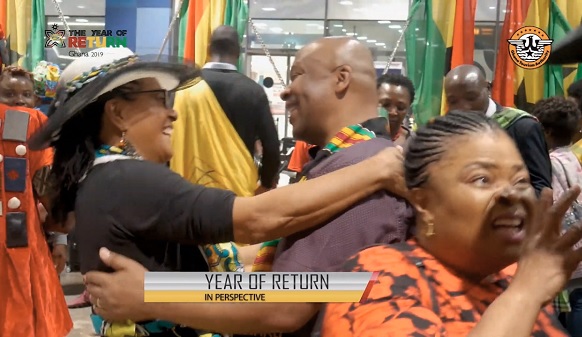
Tourism’s moments of shame
After Ghana’s impressive, if delirious, tourism performance in 2018/2019 that has earned us a pat by the global community, I feel duty bound to remind us that having climbed up this high, we must purpose in our hearts to stay there.
Staying on top only means doing things right.
One of the things we are not doing right has to do with our greed. After the long drought, in terms of international arrivals, during which Ghana was obviously on a plateau, the Year of Return marked our first rainfall. Yet, rather than see it as an opportunity for repeat business, our hoteliers allowed what is fast gaining global recognition as “the proverbial Ghanaian greed” to get the better part of us, instead of the one-time “proverbial Ghanaian hospitality”.
Impression
In late December 2019 and the first few weeks of 2020, as we drew the curtain on the hugely successful Year of Return, what many of the tourists sent home was a very unfortunate impression, that Ghanaians took advantage of them by deliberately hiking hotel room rates.
It was all over social and traditional media. I heard condemnations by officials of GTA but what is the way forward? What somebody had not told our hoteliers was that the majority of international tourists, especially the Americans and West Europeans whom we target, are ordinary workers who save up to two to three years to be able to afford a single holiday. The millionaires among them are a few.
Our dog eat dog mentality was manifest in our domestic tourism drive last year.
Take the 2019 Paragliding event at Kwahu. Hundreds of Ghanaians and some Ghana-based foreigners who responded to the “Kwahu-o-Kwahu” slogan arrived at the hotels only to be shocked by the hike in room rates.
For a single bed, budget hotels in Kwahu, whose normal rack rate had been GH¢60.00 before paragliding, suddenly started quoting GH¢142.00 at the peak of the event. One-star hotels hiked their rates from GH¢123.00 to GH¢266.00 and two-star hotels charged GH¢509.00 during paragliding instead of their normal GH¢179.00.
Room rates for double beds in one-star hotels shot up from GH¢179.00 per night to GH¢403.00, while two-star hotels with advertised rate of GH¢195.00 per night started quoting GH¢729.00.
Yet, everybody who has been associated with the leisure industry in Ghana knows that the bane of domestic tourism promotion has always been where to sleep - accommodation, the right kind affordable by the Ghanaian working class.
![]()
Fantasitc paragliding events in 2019, but there were issues with quality and pricing at Kwahu hotels
Quality control
While we may not be able to do something drastic to tame our greed, the Ghana Tourism Authority (GTA) is hereby being urged to do something, and urgently, about Quality Control. Asked to rate their overall satisfaction level, less than 31 per cent of domestic tourists who lodged in Kwahu hotels during the 2019 Paragliding found anything ‘excellent’ —from fixtures and facilities; impressions/appeal; professionalism/ cleanliness/quality of food, drinks and service
The feedback recorded by GTA’s own Research Department was a litany of woes, notably (i) low standard and quality of service and (ii) non-adherence to basic hygiene.
Overall, they ranked service culture ‘below satisfactory’ while they described the hotel staff as “pleasant but not professional”.
On a happier note, the Ministry of Tourism and the GTA should feel proud that their efforts are gradually drawing attention to the impact of domestic tourism on a local economy.
In the 2019 Paragliding, a total of 266 passengers, both Ghanaians and foreigners, notably Germans, Chinese and Indians who participated, put into the Kwahu economy an estimated GH¢630,240.00.
On the average, they spent GH¢462.00 daily on food and beverage, accommodation, shopping and transportation.
Some 49 per cent of them stayed four nights, while 29 per cent stayed three nights.
On an even happier note, I am proud to announce that Ghana now boasts the largest hotel in Africa and 50th in the world.
This is the Rock City Hotel located at Nkwatia Kwahu.
Quite an ambitious dream, the owners are going for 2,000 rooms! Starting with 83 rooms, Rock City, which has taken 11 years to build, is a leisure paradise.
Project
Question: What is happening to the Single Window Project launched in 2018? A project with the potential to be a game changer, it is a portal through which all tourism enterprises can market themselves.
The infrastructure is designed to automatically record operations at all attractions and tourism plants, including hotel occupancy,
country of origin of the guests, among other statistics, to enable the GTA research and quality control teams to do monitoring without stepping out of their offices.
This makes it the easiest and most convenient means of collecting the one per cent Tourism Levy.
The last time I checked, the process had been stalled by issues to do with procurement of a vendor and challenges with numbers: most of the budget hotels (some 3,000 of them) are not equipped with computers that can automatically record transactions. Those with computers are in locations with connectivity issues.
I have not been to any of the castles and tourist attractions in the last one year or so, but it is my prayer that the Digital Revenue Mobilisation strategy to streamline revenue collection and minimise leakages at tourist sites is on course.
It took off in 2018 and within two weeks — from July 3 through July 18 — when the point of sale device was installed at Wli Waterfalls, revenues jumped from GH¢4,000.00 to GH¢13,008.
